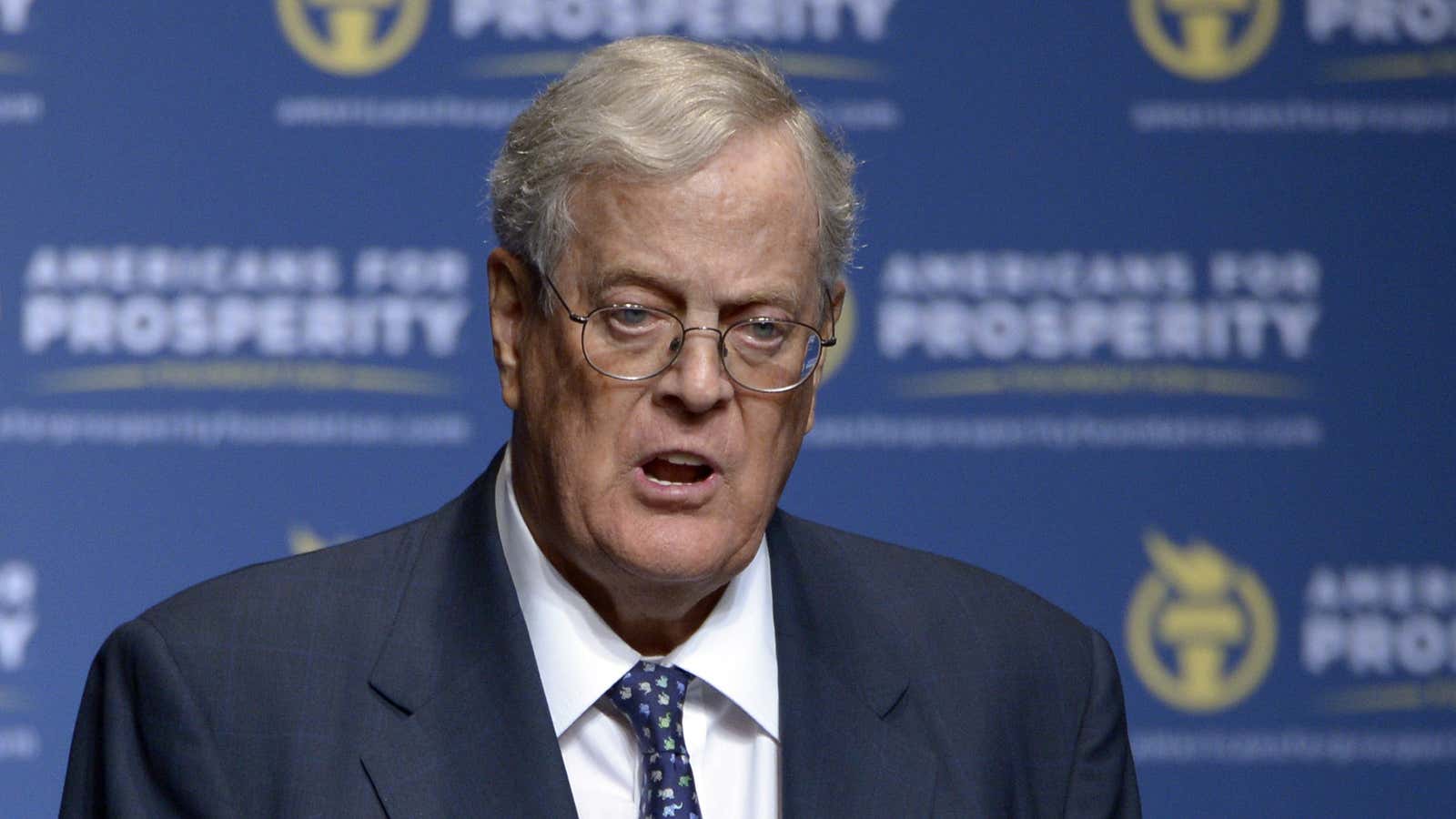David Koch was no friend of US president Donald Trump. The businessman and conservative icon, who died today at age 79, made little secret of his dislike of the president or his policies—his tariffs, the travel ban, and almost everything else about him.
So they surrounded him with their allies instead.
The sons of Koch Industries founder Fred Koch, David Koch and his brother Charles were born into extraordinary wealth. For decades, they used their billions to wield political influence, supporting a sprawling network of conservative nonprofits closely aligned with their mission—right-wing libertarianism. The crux of this, as Charles Koch once put it, was a desire for “economic freedom”—with as little power in the hands of centralized government as possible. In short, he wrote, “big governments are inherently inefficient and harmful.”
The brothers favor minimal government “intrusions,” encompassing conservative economic policies such as minimal taxation and free trade, as well as more liberal, anti-interventionist social policies. Many of their main areas of concern have closely aligned with Koch Industries’ business interests, ushering in candidates who deny climate change, were likely to promote fossil fuel use, and support environmental deregulation.
They did this through organizations like Americans for Prosperity, which supported the establishment of the Tea Party movement, while concealing the identities of other, more media-shy, conservative donors.
When it came to Trump, who rose to political power on the heels of the Tea Party movement, their enthusiasm was much more muted. But while they may not like Trump’s style, and have publicly refused to donate directly to Trump’s campaign, the brothers’ influence is apparent in the president’s choice of advisors, including official counselor Kellyanne Conway. The president’s cabinet remains a who’s-who of Koch affiliates. Their nearly $900 million budget for the 2016 election seems to have had the desired effect.
Koch may be dead, but many of his preferred political figures—and, by extension, his preferred policies—continue to thrive in the highest positions of power. Here’s how.
Vice President Mike Pence
During the 2016 presidential campaign, then-trusted Trump advisor and the high-powered arch-conservative Steve Bannon expressed concerns that a potential Pence president would be “a president that the Kochs would own.” This pretty much sums up the long-held loyal relationship between Pence and the Kochs, which dates back to his time as an Indiana congressman in the early 2000s. Though a channel for the their influence in the White House, Pence differs from David Koch in his anti-choice evangelical position.
Secretary of Energy Rick Perry
The Koch brothers are above all petrochemical magnates, so there is arguably no cabinet position more important than energy secretary. Perry, who once studied animal husbandry and has in the past actually recommended abolishing the energy department, might not be the most qualified for the job. But he is an important representative of the Koch’s interests at the country’s most important table. A climate change denier, Perry has been pushing for more fossil fuel and has called attempts to replace them with renewables “immoral.”
Secretary of State Mike Pompeo
Formerly nicknamed the “congressman from Koch,” Pompeo is a member of the Wichita, Kansas, business community—the Kochs’ home base. He made the jump into politics thanks almost entirely to the Kochs’ support. He has, in fact, received more money from the brothers than any other single individual. Pompeo has shown his gratitude toward his donors by favoring environmental deregulation on energy production, and by defending his benefactors in the public arena, including an op-ed unsubtly titled “Stop Harassing the Koch Brothers.”
Secretary of Commerce Wilbur Ross
The billionaire investor was a close personal friend of David Koch’s. He was photographed with the late financier and pedophile Jeffrey Epstein at a dinner party at his home in 2010. (Koch was among Epstein’s personal friends.) Ross and his wife later attended Koch’s 2016 holiday party.
Secretary of Transportation Elaine Chao
Chao is the wife of Senate leader Mitch McConnell, and a regular guest at Koch donor events. As secretary of labor under US president George W. Bush, Chao spoke at the 2002 annual meeting of the American Legislative Exchange Council (ALEC). Koch Industries is a longtime member of ALEC’s corporate board. She was also a fellow of the Heritage Foundation, a think-tank closely tied to the Koch brothers’ political ambitions.
Secretary of Education Betsy DeVos
Trump appointed the billionaire and charter school advocate as education secretary in 2017. Her family has close ties to the Koch brothers’ political fundraising, donating millions in 2016 to super-PACs, including the Koch-backed Freedom Partners Action Fund. Devos is a regular attendee at the Kochs’ biannual donor meeting, and is a financial backer of Koch-affiliated groups such as Americans for Prosperity, and the George Mason University-based Mercatus Institute. In October 2018, the education secretary met privately with members of the Koch-funded group Youth Entrepreneurs at a Koch Industries office in Wichita, Kansas.
